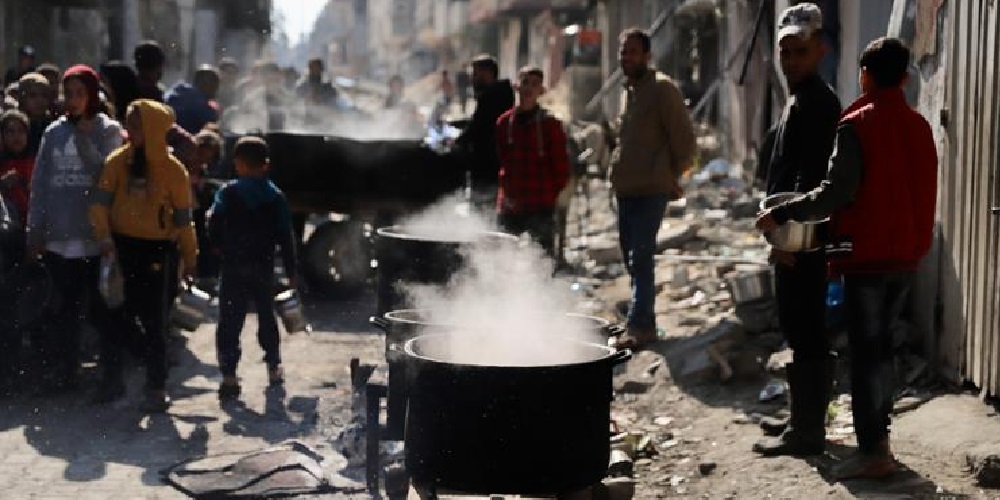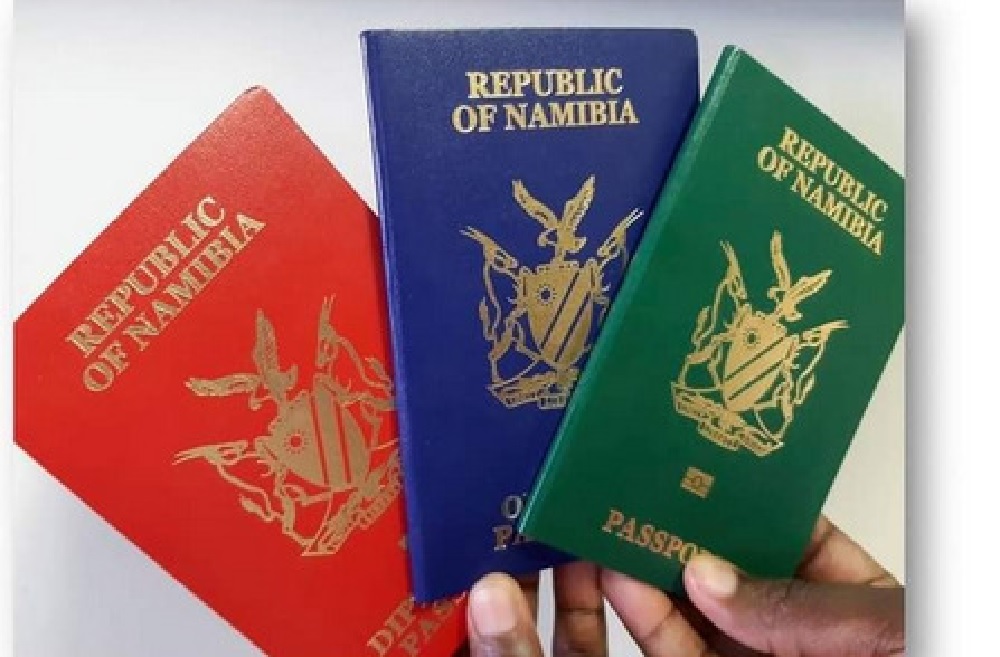Foreign
Israel Forces Fire On Gazans Rushing For Food Aid

Israeli forces in war-torn Gaza opened fire on Palestinians scrambling for food aid in a chaotic melee on Thursday that the health ministry in the Hamas-run territory said killed more than 100 people.
The Israeli military said a “stampede” occurred when thousands of desperate Gazans surrounded a convoy of 38 aid trucks, leading to dozens of deaths and injuries, including some who were run over by the lorries.
An Israeli source acknowledged troops had opened fire on the crowd, believing it “posed a threat”.
The Gaza health ministry condemned what it called a “massacre” in Gaza City in which 112 people were killed and more than 750 others wounded.
The incident adds to a Palestinian death toll from the war which the ministry earlier Thursday said had topped 30,000, and dampens hopes a truce deal between Israel and Hamas militants could be just days away.
There were conflicting reports on what exactly unfolded in the hours before dawn.
A witness in Gaza City, declining to be named for safety reasons, said violence unfolded when thousands of people rushed towards aid trucks at the city’s western Nabulsi roundabout, and soldiers fired at the crowd “as people came too close” to tanks.
Israeli army spokesman Daniel Hagari said the military had fired “a few warning shots” to try to disperse a crowd that had ambushed the aid trucks.
When the crowd got too big, he said the convoy tried to retreat and “the unfortunate incident resulted in dozens of Gazans killed and injured”.
Aerial images released by the Israeli army showed what it said were scores of Gazans surrounding aid trucks in Gaza City.
Ali Awad Ashqir, who said he had gone to get some food for his starving family, told AFP he had been waiting for two hours when trucks began to arrive.
“The moment they arrived, the occupation army fired artillery shells and guns,” he said.
The army spokesman Hagari later denied Israeli forces carried out any shelling or strikes at the time.
‘Another day from hell’
US President Joe Biden said Washington was checking “two competing versions” of the incident, while a State Department spokesman said the United States had been in touch with Israel and was “pressing for answers” on what happened.
The shooting incident would complicate efforts to broker a truce, Biden said, later admitting that any deal was unlikely to happen by Monday — the timeline that he had predicted earlier this week.
The US president spoke with Qatari and Egyptian leaders in separate phone calls, the White House said, saying he discussed both the ceasefire and the “tragic and alarming” aid incident.
The UN Security Council will hold a closed-door emergency meeting on the incident on Thursday afternoon.
Saudi Arabia strongly condemned what it called the “targeting” of unarmed civilians, while Kuwait and the UAE also issued condemnations.
Qatar warned that Israel’s “disregard for Palestinian blood… (will) pave the way for an expanding cycle of violence”.
Italy called for an immediate ceasefire in Gaza to facilitate more humanitarian aid.
Looting of aid trucks has previously occurred in northern Gaza, where desperate residents have taken to eating animal fodder and even leaves to try to stave off starvation, as aid groups warn of looming famine after nearly five months of war.
The chief of the United Nations agency for Palestinian refugees, UNRWA, said that no UN agency had been involved in Thursday’s aid delivery, and called it “another day from hell”.
Truce hopes
The war began on October 7 with an unprecedented Hamas attack on southern Israel that resulted in the deaths of around 1,160 people, mostly civilians, Israeli figures show.
Militants also took about 250 hostages, 130 of whom remain in Gaza, including 31 Israel says are presumed dead.
Israel’s retaliatory military campaign has killed 30,035 people, according to the Hamas-run Gaza’s health ministry.
Israel’s military says 242 soldiers have died in Gaza since ground operations began in late October.
Washington, a key ally of Israel, has been pushing for a reduction in civilian casualties and a ceasefire.
It has been working with mediators from Egypt and Qatar to seek a six-week pause in the war.
Negotiators had hoped a truce could begin by around March 10 or 11 when the Muslim holy month of Ramadan begins, depending on the lunar calendar.
The proposals reportedly include the release of some Israeli hostages held in Gaza by militants in exchange for hundreds of Palestinians held in Israeli prisons.
Short of the complete withdrawal Hamas has called for, a source from the group said the deal might see Israeli forces leave “cities and populated areas”, allowing the return of some displaced Palestinians and humanitarian relief.
Fears of famine
The World Food Programme has said Israel has blocked access for aid deliveries — which Israeli officials have denied — and warned that if nothing changes, “a famine is imminent in northern Gaza”.
As fighting continued in Gaza, Muhammad Yassin, 35, battled to find flour in Zeitun.
“We have not eaten a loaf of bread for two months,” he said. “Our children are starving.”
In the south, nearly 1.5 million people trying to flee the fighting are now packed into Rafah city, also short of food, as Israel threatens to send in troops against Hamas fighters.
Israeli Prime Minister Benjamin Netanyahu has come under increasing pressure to bring the remaining hostages home.
A group of 150 Israelis have started a four-day march from Reim, near the Gaza border, to Jerusalem, calling for the government to reach a deal.
Violence has also surged in the occupied West Bank, where two Israelis were killed on Thursday.
AFP
Foreign
Journalists rally against White House’s decision to modify allocation of seats in briefing room

The White House said Monday it is “seriously considering” taking control of deciding which journalists get seats in the famed briefing room, in the latest bid by President Donald Trump’s administration to exert power over the media.
The 49 spots in the press room, where spokespeople, officials and occasionally the president take the podium, have long been allocated by the non-partisan group of independent journalists, the White House Correspondents Association.
White House Press Secretary Karoline Leavitt accused the WHCA of trying to maintain a “monetized monopoly over the briefing room.”
“As for switching up seating in the briefing room, it’s something we are seriously considering,” she told Fox News.
“The briefing room is part of the People’s House, it belongs to the American people. It does not belong to elitist journalists here in Washington DC.”
News outlet Axios reported earlier that the White House wanted to take control of the seating chart to give more prime front-of-room spots to new media, and move some legacy outlets further back.
The WHCA, of which AFP is a member, opposed the “wrong-headed” move.
“The reason the White House wants control of the briefing room is the same reason they took control of the pool: to exert pressure on journalists over coverage they disagree with,” WHCA President Eugene Daniels said in a statement.
The WHCA and the White House both said they had tried to broker a meeting on the issue.
It is the latest effort by the White House to shape who covers Trump after taking control from the WHCA in February of the “pool” that covers the president in the Oval Office and when he travels on Air Force One.
The White House has added access to the pool for new and in several cases openly pro-Trump media, while reducing access to mainstream organisations.
It also continues to bar the Associated Press news agency from almost all presidential events as it refuses to refer to the Gulf of Mexico as the “Gulf of America,” the name newly decreed by Trump.
AFP
Foreign
Ghana: Govt cancels sale of diplomatic properties in Nigeria, Zambia

The Ghanaian government has canceled two transactions initiated by the previous administration under the leadership of former president Nana Akufo-Addo to sell Ghanaian diplomatic properties in Nigeria and Zambia.
“Yesterday I informed Parliament that with the full backing of President Mahama, we have cancelled two transactions initiated by the previous Akufo-Addo/Bawumia government to sell Ghanaian diplomatic properties in Nigeria and Zambia.” Minister of Foreign Affairs, Hon. Samuel Okudzeto Ablakwa announced on his X.
According to the Member of Parliament for North Tongu, the current administration is determined to retrieve an illegal part payment in one of the transactions.
Adding that those who are involved in these illegal transactions will be sanctioned.
“Determined efforts are underway to retrieve an illegal part payment in one of the transactions. The masterminds, who are currently on the run will surely be found and sanctioned.” He added.
He said the NDC government is committed to their promise that no diplomatic property belonging to the people of Ghana would be sold under President John Dramani Mahama administration.
Hon. Ablakwa warned that none of our diplomatic properties either in Ghana or any of our 71 diplomatic missions abroad are available for sale.
“We mean it when we say no diplomatic property belonging to the people of Ghana would be sold under our watch. Notice is hereby served that none of our diplomatic properties either in Ghana or any of our 71 diplomatic missions abroad are available for sale — hands off!” He stated.
According to him, they will use the principles of Operation Recover All Loots (ORAL) to protect properties belonging to the state as well as the public purse.
“The principles of ORAL, strict abhorrence for State Capture and the national interest shall continue to guide our decisions. For God and Country.” Ablakwa assured.
Source: Elvisanokyenews.net
Foreign
Namibia to enforce visa requirement on U.S citizens

Namibia has imposed visa requirements on U.S. citizen tourists starting from April 1, 2025.
According to the Namibian Government, U.S. citizen tourists who wish to visit the Southern African country should obtain a visa before entering the country.
The U.S Embassy in Namibia posted that US visitors are required to apply for a visa through Namibia’s online visa on arrival portal: https://eservices.mhaiss.gov.na/visaonarrival.
“Beginning April 1, 2025, the Namibian Government will require U.S. citizen tourists to obtain a visa prior to entering the country. Visitors are recommended to apply for their visa in advance of planned travel through Namibia’s online visa on arrival portal: https://eservices.mhaiss.gov.na/visaonarrival. Visitors using this online visa application system must carry a hard copy of their approval notice when they travel.” The Embassy posted.
The Namibian Government added that visitors arriving in Windhoek, Walvis Bay, Katima Mulilo, Ngoma will also have the option of purchasing a tourist visa upon arrival at the respective airport or border crossing point.
“Visitors arriving in Windhoek, Walvis Bay, or entering at high volume border crossing points (e.g., Katima Mulilo, Ngoma) will also have the option of purchasing a tourist visa upon arrival at the respective airport or border crossing point. Namibia’s visa on arrival system is new and implementation details are subject to change.” They added.
The decision by the Namibian government to impose visa requirements on US citizens has met mixed reactions on social media.
While others are commending the government, others have also raised concerns about the negative impact on the Namibia economy as tourism contributes higher income to the government.
Some political actors believe Namibian female President, H.E. Dr. Netumbo Nandi-Ndaitwah took the decision to reciprocate the US government visa restrictions and some Western countries who have denied visa free entry to Namibians.
Source: Elvisanokyenews.net
-

 News5 hours ago
News5 hours agoBREAKING! Finally, Senate lifts suspension on Natasha
-

 News23 hours ago
News23 hours agoWike’s Aide reacts as photo appears online, points accusation finger at paid failed actress
-

 News18 hours ago
News18 hours agoFormer HoR member, TeeJay Yusuf calls on IGP, Kogi govt, other agencies to curb rising insecurity in Okun-Yoruba
-

 News16 hours ago
News16 hours agoSad! Popular actor, Richard Chamberlain is dead
-

 News13 hours ago
News13 hours agoReps Minority Caucus Condemns Killings in Edo State
-

 News20 hours ago
News20 hours agoEdo Killings: Kano Govt Sends Fact-Finding Delegation, Demands Justice
-

 News17 hours ago
News17 hours agoMali, Niger, Burkina Faso Impose 0.5% Levy On Goods From ECOWAS Nations
-

 News20 hours ago
News20 hours agoJust in: Popular Osun Monarch Joins Ancestors





